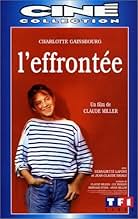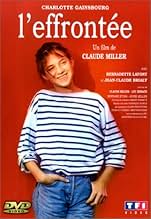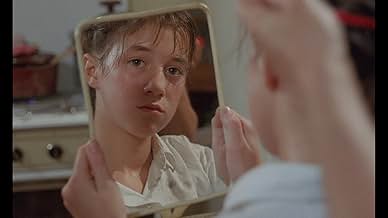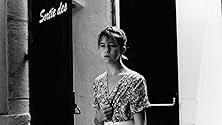L'effrontée
- 1985
- Tous publics
- 1h 36min
NOTE IMDb
6,9/10
2,3 k
MA NOTE
Mal dans sa peau, se trouvant moche et nulle, Charlotte fait tourner son père en bourrique, tourmente la petite Lulu, bref s'ennuie. Quand elle croise au village une célèbre pianiste de son ... Tout lireMal dans sa peau, se trouvant moche et nulle, Charlotte fait tourner son père en bourrique, tourmente la petite Lulu, bref s'ennuie. Quand elle croise au village une célèbre pianiste de son âge, Charlotte fantasme sur une amitié qui l'emporterait au loin. [255]Mal dans sa peau, se trouvant moche et nulle, Charlotte fait tourner son père en bourrique, tourmente la petite Lulu, bref s'ennuie. Quand elle croise au village une célèbre pianiste de son âge, Charlotte fantasme sur une amitié qui l'emporterait au loin. [255]
- Réalisation
- Scénario
- Casting principal
- Récompenses
- 3 victoires et 6 nominations au total
Simon de La Brosse
- Jacky Castang
- (as Simon de la Brosse)
Armand Barbault
- Patron 'Perroquet'
- (non crédité)
Pascal Bianco-Levrin de Bouzid
- Kid at the Pool
- (non crédité)
Daniel Chevalier
- Professeur Lycée
- (non crédité)
Avis à la une
Claude Miller likes to portray unhappy people as he believes that nothing happens to happy people. His films have won him both critical as well as Box Office success. L'Effrontee shows how hard it is to live as a neglected child with desires and aspirations. Claude Miller's poetic mis- en-scene imparted divine exquisiteness to a pure tale of uncertainty. Charlotte experiences the passage from childhood to adolescence in a difficult manner. Miller has created one of the best coming of age film in years. Things become tough for Charlotte when she is introduced to an alien world of music. She reminds us of our childhood dreams and frustrations. Miller has always championed the cause of young characters in his films portraying complex personal relationships. L'Effrontee is similar to his earlier film "La meilleure facon de marcher" as he has aimed to portray joys and sorrows experienced by adolescents in their formative years. As a cinéaste who learned his métier from Truffaut, Claude Miller will continue to create stories of troubled childhoods.
France has a long tradition of making movies centered around adolescence. From Truffaut's "The 400 blows" (1958), to Pinoteau's "La Boum" (1980), many a French film have marked generations of teens. "L'effrontée" is one of them, rightly acclaimed when it came out, and as sweet a story as it can get.
The movie follows Charlotte Gainsbourg's homonymous teenage character, an arrogant girl who is more sophisticated than teens of her age. Both of her parents have died, and so she lives with two simple, quite close-minded adults, with her only friend being a sick child, Loulou, who lives next door. All this changes when child prodigy Clara Baumann comes to the city for a piano recital. The heroine tries to befriend her, and falsely believes that Baumann wants her as her impresario. In the course of the story, the protagonist takes valuable lessons about friendship, the sense of belonging, and family.
The director, Claude Miller, had risen to popularity with his noir classic, "Garde à vue" in 1981. His fame mostly stemmed from crime films, such as the aforementioned and the intricate, "Mortelle randonnée " (1983),in which he paired Michel Serrault and Isabelle Adjani in a gripping story of murder and love. It is though, in "L'effrontée" where his true skills shine. Like Truffaut before him, Miller seems to understands the youth regarded as outcasts. Our heroine is an intellectual, whose irritation comes from the fact that no one wants to understand her, since her way of behaviour is strange for a kid her age. In the film, she is presented both as forward-thinking, wanting to escape life in her dull small town, and self-centered, as she has no problem leaving everyone behind in order to achieve her goal. In the end, though, most viewers will empathize with her passion for life, her will to rise, and become something more than just a small -town girl.
Gainsbourg's acting was excellent and she rightly deserved her César for most promising actress. The others were good, too, but it's through her that the film becomes what it is. The whole movie serves as a journey to the young heroine, who cries, laughs, dreams, tries to find a person to look up to, only to understand in the end that this person isn't the one she was searching for.
The music makes this film even more enjoyable. Although there is no original score, the viewers are served to frequent listening of European super -hit "Sarà perché ti amo" by Ricchi e poveri. The song also serves as a way to discover Charlotte Gainsbourg's character in the film. It's a simple pop song, mainstream music, something that the common teenagers of the time listened to. By listening to it, the heroine betrays the very same thing she wants to be; a sophisticated, grown-up person. It's not that she has any particular passion for classical music; the only reason she wants to go with Clara is to find her own idol, to differentiate herself from her environment. In reality, though, she remains an ordinary teenager, prefering chart-toppers to masterpieces of music.
The film makes an interesting point about teen idols and friendships. If we put the average teen in the place of the protagonist, most of them would also see themselves as unique, and would want to escape their family environment. Every teenager has a Clara Baumann, although they probably haven't met her in person. It's their idol, a person they look up to, they want to be like and they imitate. It's a sad reality, though, that many of these idols are too different, too perfect, for teens to really emulate, and believe they are one of them. While it's not correct to give up one's dreams, it's more important to focus on the present, and help those who need you now,your family, and your real friends, Miller tells us. Because,at the end of the day, it's not the over-ambitious Charlotte, or the talented Clara that benefits the most, but the simple, sickly, annoying Loulou.
What more can I say about "L'effrontée"? It's such a charming film that I loved everything about it. The 80's is not only the lavishness of "Star Wars", the adventurousness of "Indiana Jones", and the fun of "La Boum". It's also the sweetness of "L'effrontée". Claude Miller did it again, and way better this time.
The movie follows Charlotte Gainsbourg's homonymous teenage character, an arrogant girl who is more sophisticated than teens of her age. Both of her parents have died, and so she lives with two simple, quite close-minded adults, with her only friend being a sick child, Loulou, who lives next door. All this changes when child prodigy Clara Baumann comes to the city for a piano recital. The heroine tries to befriend her, and falsely believes that Baumann wants her as her impresario. In the course of the story, the protagonist takes valuable lessons about friendship, the sense of belonging, and family.
The director, Claude Miller, had risen to popularity with his noir classic, "Garde à vue" in 1981. His fame mostly stemmed from crime films, such as the aforementioned and the intricate, "Mortelle randonnée " (1983),in which he paired Michel Serrault and Isabelle Adjani in a gripping story of murder and love. It is though, in "L'effrontée" where his true skills shine. Like Truffaut before him, Miller seems to understands the youth regarded as outcasts. Our heroine is an intellectual, whose irritation comes from the fact that no one wants to understand her, since her way of behaviour is strange for a kid her age. In the film, she is presented both as forward-thinking, wanting to escape life in her dull small town, and self-centered, as she has no problem leaving everyone behind in order to achieve her goal. In the end, though, most viewers will empathize with her passion for life, her will to rise, and become something more than just a small -town girl.
Gainsbourg's acting was excellent and she rightly deserved her César for most promising actress. The others were good, too, but it's through her that the film becomes what it is. The whole movie serves as a journey to the young heroine, who cries, laughs, dreams, tries to find a person to look up to, only to understand in the end that this person isn't the one she was searching for.
The music makes this film even more enjoyable. Although there is no original score, the viewers are served to frequent listening of European super -hit "Sarà perché ti amo" by Ricchi e poveri. The song also serves as a way to discover Charlotte Gainsbourg's character in the film. It's a simple pop song, mainstream music, something that the common teenagers of the time listened to. By listening to it, the heroine betrays the very same thing she wants to be; a sophisticated, grown-up person. It's not that she has any particular passion for classical music; the only reason she wants to go with Clara is to find her own idol, to differentiate herself from her environment. In reality, though, she remains an ordinary teenager, prefering chart-toppers to masterpieces of music.
The film makes an interesting point about teen idols and friendships. If we put the average teen in the place of the protagonist, most of them would also see themselves as unique, and would want to escape their family environment. Every teenager has a Clara Baumann, although they probably haven't met her in person. It's their idol, a person they look up to, they want to be like and they imitate. It's a sad reality, though, that many of these idols are too different, too perfect, for teens to really emulate, and believe they are one of them. While it's not correct to give up one's dreams, it's more important to focus on the present, and help those who need you now,your family, and your real friends, Miller tells us. Because,at the end of the day, it's not the over-ambitious Charlotte, or the talented Clara that benefits the most, but the simple, sickly, annoying Loulou.
What more can I say about "L'effrontée"? It's such a charming film that I loved everything about it. The 80's is not only the lavishness of "Star Wars", the adventurousness of "Indiana Jones", and the fun of "La Boum". It's also the sweetness of "L'effrontée". Claude Miller did it again, and way better this time.
Most of the times the smallest things in life are the greatest and in cinema that's not any different. It's been a long long time since I saw such a supertalent as Charlotte Gainsbourg (yeah, daughter of...) and with justified reasons this movie was be a sort of springboard for Charlotte's further career. Charlotte plays the role of a teenager whose life is totally overruled by boredom both by the persons she's surrounded with (her only friend is a sick ten year old girl Lulu) and the village she lives in. Nothing ever happens and the usual parties at the local disco cant convince Charlotte in no way...all she wanna do is escape if only she could. But then it happens when a girl of her age enters the village to give a concert (the girl is a pianoplayer who is worldwide respected). Charlotte tries everything to become the pianist best friend with only one purpose : to escape from the dull world she is living in... As said the whole film has one focal point : Charlotte Gainsbourg and it is perhaps the best teenermovie ever made and it makes you forget the many stupid things that were sended by us by the likes of Matthew Broderick or any other John Hughes-icons. Superb movie!
François Truffaut and Jacques Doillon who have often worked with children know well one thing: making a movie about childhood or adolescence is a quite difficult thing. Here, it is Claude Miller's turn to broach the delicate topic of adolescence. The less we can say is that he signed here a sensitive and bitter work that brings out enough strength and emotion to compare with the filmmakers' movies previously quoted.
The first indisputable quality that we can put forward is the following one: Claude Miller's film is very far from the clichés generally attributed to teenagers. Charlotte isn't a nymphet, only a teenage girl who is not a happy person and who's searching for love and understanding. The director succeeds very well in making us share his heroine's profound discontentment and Charlotte Gainsbourg won a well-deserved Oscar for her remarkable performance.
Apart from the relevant and convincing description of Charlotte, Miller painted a series of characters who are never on the edge of caricature. Lulu is perhaps a naive little girl and the director somewhat made her look ugly by giving her glasses but he does everything to hide her dumb air. Then, Charlotte's father is presented as a good man and faced with her daughter's insolence, he can contain his anger. One last example, Clara's manager is not obsessed with money. With Charlotte Gainsbourg, it would be unfair to neglect the rest of the cast. Either the actors are young or old, they all have a common point: they are all excellent. This only confirm one gift that Claude Miller had already shown in his first movie, the harrowing "la meilleure façon de marcher" (1976): an excellent direction of actors.
Besides, like in "la meilleure façon de marcher" (1976), "l'effrontée" (1985) is a perfectly stable movie, both funny, touching and where Miller skilfully alternates moments of tension and calm and the rare moments of violence are only suggested like the scene when Charlotte hits Jean with his globe.
Quite obviously, what mainly interested the director in this film is Charlotte's relationship with the most important character of the film: Clara Baumann. Their confrontations constitute the key-moments of the movie. Clara is a talented young pianist and Charlotte blindly idolizes her. She is ready to believe everything she says, even when Clara confides to her that she would like to become her impresario on tour. It is interesting to note down that when she talks about Clara, Claude Miller gently laughs at her naivety. More important, through their relationship, Miller compared their respective worlds. The music used (the song "Sarà, perché ti amo and Mozart) reveal the incompatibility of these worlds and the beginning of the sketched friendship (but is it really friendship?) is eventually bound to fail. To tell this failure, Miller proceeds by little touches: the manager's telephone that doesn't answer, Lulu who creates a scandal during the show. This failure clearly shows Charlotte's disillusion but it doesn't stop the movie to end on a positive tone: when we see the heroine take care of Lulu, she seems to have understood that her place is among her family.
The movie also contains another strong point: the relationship between Jean and Charlotte where Miller favors the progressive rise of tension. For this, he uses the same method as Charlotte's failure with Clara: he proceeds by little touches: the movie they watch at the cinema is "the Exorcist" (1973) and the tension gradually grows and explodes when they are in Jean's hotel room.
I must admit that I don't know enough Claude Miller's work. I only saw "la meilleure façon de marcher" (1976), "la petite voleuse" (1988) and this one "l'effrontée" (1985) but these three films were sufficient to make me a very good impression of this filmmaker and I am long to discover his other opus.
The first indisputable quality that we can put forward is the following one: Claude Miller's film is very far from the clichés generally attributed to teenagers. Charlotte isn't a nymphet, only a teenage girl who is not a happy person and who's searching for love and understanding. The director succeeds very well in making us share his heroine's profound discontentment and Charlotte Gainsbourg won a well-deserved Oscar for her remarkable performance.
Apart from the relevant and convincing description of Charlotte, Miller painted a series of characters who are never on the edge of caricature. Lulu is perhaps a naive little girl and the director somewhat made her look ugly by giving her glasses but he does everything to hide her dumb air. Then, Charlotte's father is presented as a good man and faced with her daughter's insolence, he can contain his anger. One last example, Clara's manager is not obsessed with money. With Charlotte Gainsbourg, it would be unfair to neglect the rest of the cast. Either the actors are young or old, they all have a common point: they are all excellent. This only confirm one gift that Claude Miller had already shown in his first movie, the harrowing "la meilleure façon de marcher" (1976): an excellent direction of actors.
Besides, like in "la meilleure façon de marcher" (1976), "l'effrontée" (1985) is a perfectly stable movie, both funny, touching and where Miller skilfully alternates moments of tension and calm and the rare moments of violence are only suggested like the scene when Charlotte hits Jean with his globe.
Quite obviously, what mainly interested the director in this film is Charlotte's relationship with the most important character of the film: Clara Baumann. Their confrontations constitute the key-moments of the movie. Clara is a talented young pianist and Charlotte blindly idolizes her. She is ready to believe everything she says, even when Clara confides to her that she would like to become her impresario on tour. It is interesting to note down that when she talks about Clara, Claude Miller gently laughs at her naivety. More important, through their relationship, Miller compared their respective worlds. The music used (the song "Sarà, perché ti amo and Mozart) reveal the incompatibility of these worlds and the beginning of the sketched friendship (but is it really friendship?) is eventually bound to fail. To tell this failure, Miller proceeds by little touches: the manager's telephone that doesn't answer, Lulu who creates a scandal during the show. This failure clearly shows Charlotte's disillusion but it doesn't stop the movie to end on a positive tone: when we see the heroine take care of Lulu, she seems to have understood that her place is among her family.
The movie also contains another strong point: the relationship between Jean and Charlotte where Miller favors the progressive rise of tension. For this, he uses the same method as Charlotte's failure with Clara: he proceeds by little touches: the movie they watch at the cinema is "the Exorcist" (1973) and the tension gradually grows and explodes when they are in Jean's hotel room.
I must admit that I don't know enough Claude Miller's work. I only saw "la meilleure façon de marcher" (1976), "la petite voleuse" (1988) and this one "l'effrontée" (1985) but these three films were sufficient to make me a very good impression of this filmmaker and I am long to discover his other opus.
Even though this film was released in 1985, I've recently watched it, and it is extraordinarily delightful! This is one of the most splendid French films I have ever seen! Claude Miller captivates his audience with a remarkable cast featuring Charlotte Gainsbourg, Jean-Philipe 'Ecoffey, Julie Glenn, Simon de la Brosse, etc. This film is filled with a lot of coming of age angst from its main characters. It's comedic moments with the constant outbursts from Charlotte are incredibly cute but also endearing. I've never encountered quite a warm and personable film as L' Effrontee before.
In addition, L' Ecffrontee also boasts a fun theme song reminiscent of ABBA, which I desperately want to download!
In addition, L' Ecffrontee also boasts a fun theme song reminiscent of ABBA, which I desperately want to download!
Le saviez-vous
- AnecdotesThe film was seen as a return by director Claude Miller to the material of his first feature, La meilleure façon de marcher (1976).
- ConnexionsFeatured in Fan des années 80: 1985 #3 (2012)
- Bandes originalesLe 2ème Concerto de Mendelssohn
Music by Felix Mendelssohn (as Mendelssohn)
Performed by Orchestre des Pays de Savoie
Conducted by Patrice Fontanarosa
Meilleurs choix
Connectez-vous pour évaluer et suivre la liste de favoris afin de recevoir des recommandations personnalisées
- How long is L'effrontée?Alimenté par Alexa
Détails
Contribuer à cette page
Suggérer une modification ou ajouter du contenu manquant

![Regarder Bande-annonce [OV]](https://m.media-amazon.com/images/M/MV5BNWMwOWFmMzctODMwYS00NDBlLWFiYzYtNDZiMjQwZDk2MzRkXkEyXkFqcGdeQW1haXdlbm4@._V1_QL75_UX500_CR0)













